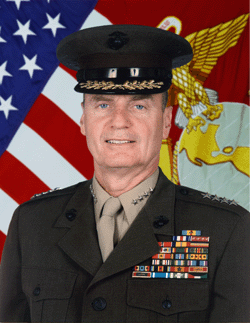Gen. James L. Jones Speaks on American Indifference to the Military
 Gen.
James L. Jones was confirmed as the 32d commandant of the Marines in June
1999. He has served in Vietnam, Japan, Germany, and Bosnia-Herzegovina.
Over the course of his 34-year career, he has earned the Defense Distinguished
Service Medal, Silver Star, Medal, Legion of Merit with four gold stars,
Bronze Star Medal with Combat "V", and the Combat Action Ribbon.
Gen.
James L. Jones was confirmed as the 32d commandant of the Marines in June
1999. He has served in Vietnam, Japan, Germany, and Bosnia-Herzegovina.
Over the course of his 34-year career, he has earned the Defense Distinguished
Service Medal, Silver Star, Medal, Legion of Merit with four gold stars,
Bronze Star Medal with Combat "V", and the Combat Action Ribbon.
Click to Return to Plan of the DayWASHINGTON - Marine Corps Commandant Gen. James L. Jones startled some
listeners the other night when he called the 26-year-old volunteer armed
force experiment a "stunning success," but added that compulsory national
service wouldn't be a bad idea, either. Jones, a ramrod-straight Mr.
Leatherneck who isn't afraid to speak his mind in a town where
Cover-Your-Rear is the name of the daily game, said Americans suffer from
an increasingly dangerous military illiteracy. The average citizen, even
the average congressman, said Jones, neither knows nor cares much about
national security. Maybe a stint of national service in the military for
young men and women would be a big help, he suggested. Bringing back the
draft is a heretical thought nowadays - one can be burned as a witch for
mentioning it or for smoking cigarettes - but Gen. Jones specializes in
unthinkable thoughts.One of the moment's great ironies, on the cusp of a new era, he said, is
that so many seem indifferent to a U.S. world leadership position that
nearly 2 million American patriots suffered death or wounds for in the
20th century. "As the pendulum swings between two centuries," said Jones,
"a major question is whether our nation will continue to accept its
leadership role on the global playing field, as it was bequeathed to us by
our ancestors." After all, he added, "we fought for it pretty hard." Jones
said the military has an ever-tougher sales job as military experience
shrinks. It used to be everyone had an uncle or a father who had answered
the trumpet call of reveille, grunged out grimy pots in mess halls, or
turned a wrench on a jet engine or a deuce-and-a-half truck tire.No longer. Armed forces recruiters say fewer than 1 in 10 prospects is
connected to a military veteran. On top of that, many high school
principals with roots in the '60s and '70s are so hostile to the military
that they won't let recruiters on the taxpayer-owned property or share
their lists of prospective graduates. Jones seems to have a deeper
appreciation than most of the depth of citizen-military misunderstanding.
So now, every time there is a quarterly capability exercise at either Camp
Lejeune, N.C., or Camp Pendleton, Calif., the Corps imports scores of
academics, politicians, educators and business leaders to watch and learn.If Jones is worried about military illiteracy, we ought to listen. Jones
leads a service that has a greater share of citizen-soldiers than the
others do, and is the least careerist of all. Some 68% of 172,000 Marines
on active duty are 23 years old or younger. So the Marine Corps needs to
recruit 39,000 kids a year, more than 3,000 a month, more than
100 a day, and for five years it has had no trouble whatsoever in meeting
its needs. Moreover, every year the Marine Corps returns 37,000 men and
women to civilian society, mostly one-termers.But military illiteracy is spreading. Seats on the armed services
committees in Congress - once blue-ribbon spots - are less desired. John
Hamre, former Deputy Defense Secretary who now heads the Center for
Strategic and Military Studies, says he has a hard time attracting Congress
members to strategic or diplomatic discussions, but 18 showed up for a
recent session on biotechnology. Gen. Jones laughs that, too frequently,
his conversations with civilians begin with the question, "So how long have
you been in the Army?"Military illiteracy is common in news coverage, most recently in the rush
to judgment that civilians had steered the submarine USS Greeneville into a
Japanese fishing boat off the Hawaiian coast. Military stories tend to
center around social issues, such as gays in uniform or treatment of women
in the armed services, rather than central military questions such as how
an armed destroyer like the USS Cole could allow itself to be blown up by
terrorists.Americans' low tolerance for taking casualties was part of Saddam Hussein's
strategic thinking in his 1990 invasion of Kuwait. He didn't think we would
fight. He almost was right. Despite accident rates that are historically
much lower than other non-war years (774 U.S. aircraft crashed in 1954) the
military is being asked to observe a zero-defects mentality in what are
very dangerous occupations.So there are many signs that Jones's assessment of civilian illiteracy
about military matters is genuine cause for concern. His idea for national
military service deserves more careful study. It would be good for the
country as well as for the services, which are in danger of becoming havens
for Cover-Your-Rear careerists unable to lead the nation into the 21st
century.